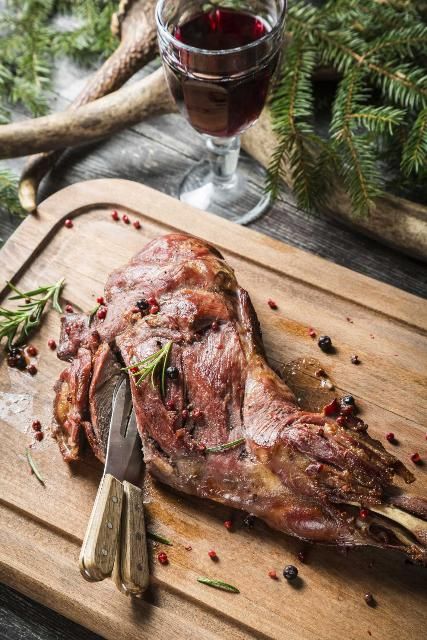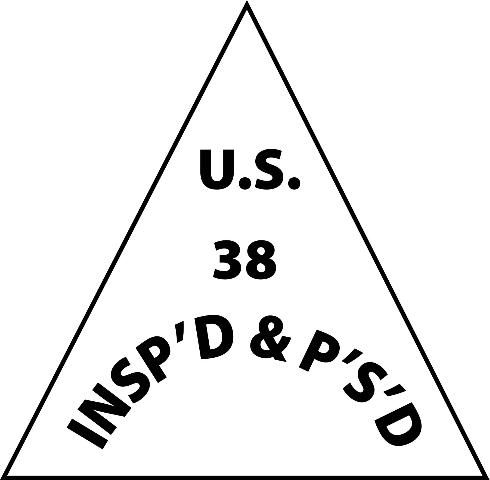Game meats provide wholesome and nutritious animal protein, but learning the regulations (and which agency has jurisdiction over which regulations) can be burdensome for those who want to be entrepreneurial. The purpose of this document is to be a "one-stop-shop" for Florida residents who want to sell products from alligators, wild game, or their own farmed game or birds.
I do not raise livestock or poultry, but I do raise game species such as bison and farmed deer. What do I need to do to sell meat from those animals?
These animals and essentially all game (wild or farmed) are non-amenable, meaning that those species are not listed specifically in the Federal Meat Inspection or Poultry Products Inspection Act.

Credit: iStock/Thinkstock.com
These species are not required to be processed under US Department of Agriculture's Food Safety Inspection Service (USDA-FSIS) inspection for wholesale or retail sale as required for amenable species, but these species are subject to US Food and Drug Administration (FDA) regulations. Collectively, slaughter inspection for farmed game species is not required by federal law but may be useful as a voluntary marketing tool.
The USDA can provide voluntary inspection of some non-amenable species for a fee, but only certain non-amenable species are eligible for voluntary inspection under Title 9 of the Code of Federal Regulations, Section 352.1 (9 CFR §352.1; https://www.govinfo.gov/app/details/CFR-2011-title9-vol2/CFR-2011-title9-vol2-sec352-1). Species such as llama and alpaca are currently not eligible for voluntary inspection.

Credit: USDA-FSIS
Voluntary slaughter inspection is often driven by customer requirements to sell products commercially and are generally conducted on farmed cervids, such as deer and elk, and on buffalo and bison. Voluntarily FSIS-inspected and passed products will receive a triangular seal (Figure 2). (More information about non-amenable species can be found here: http://www.fsis.usda.gov/wps/wcm/connect/fsis-content/internet/main/newsroom/meetings/newsletters/small-plant-news/small-plant-news-archive/spn-vol5-no4.)
The facilities in Florida willing to slaughter exotic species is listed here (Carr et al., 2008; https://edis.ifas.ufl.edu/pdffiles/an/an20300.pdf), under the table column heading of "Species Harvested."
I am not sure I can load these animals to take them to a slaughter facility. What can I do?
Non-amenable animal species that are difficult to load, transport, and handle can be killed directly on-farm. Animals entering the USDA voluntary inspection program must submit a request for field harvest and receive approval before commencement. Antemortem inspection must be performed by a USDA inspector in the field. More information about field harvest of non-amenable species is found on page 36 of Cornell University's Guide to Direct Marketing Livestock and Poultry (Goodsell and Stanton, 2011; https://smallfarms.cornell.edu/resources/).
I want to sell meat from wild hogs I have killed while hunting. What do I have to do?
Florida's population of feral hogs have the same genus and species as commercially produced hogs. Sus scrofa domestica is the subspecies of a commercially produced pig and Sus scrofa fera is the subspecies of a feral hog; thus, both are recognized by United States Department of Agriculture's Food Safety Inspection Service (USDA-FSIS) as an amenable species. For products to be sold commercially, all pigs must be slaughtered under FSIS inspection (https://ask.usda.gov/s/article/Which-species-of-swine-are-amenable-to-the-Federal-Meat-Inspection-Act).
Can I sell meat from game I have killed while hunting?
Meat from animals killed during hunting cannot be sold legally in Florida, except for alligator meat (https://www.flrules.org/gateway/RuleNo.asp?title=RULES RELATING TO GAME&ID=68A-12.004).
What do I need to do to sell meat from alligators I have killed while hunting?
To sell meat from your own legally hunted and killed alligators, the meat must be processed from carcasses that are skinned, processed, and packaged in a facility permitted by the Florida Department of Agriculture and Consumer Services (FDACS) and Florida Fish and Wildlife Conservation Commission (FWC).
If you possess an FWC alligator-trapping or alligator-farming license, you can apply for and receive a No Cost Alligator Processing Permit (https://myfwc.com/media/1731/alligator-nocost-application.pdf). If you do not have an FWC alligator-trapping or alligator-farming license, you must apply for the $250 Alligator Processing Permit (https://myfwc.com/media/1688/alligator-apl.pdf).
Regardless of FWC permit, both facilities must have a completed inspection and a permit as an alligator processor from the Florida Department of Agriculture and Consumer Services (FDACS; http://www.freshfromflorida.com/content/download/23977/486640/FirmReferenceList_sorted_alphabetically.pdf), with an annual fee of $520.
For more information about selling meat from hunted alligators, refer to Fla. Admin. Code r. 68A-25.052 in the FWC alligator rules booklet (https://myfwc.com/media/1744/alligator-rules-booklet.pdf).
I see snack sticks and summer sausage (which contain wild game) that have the conventional stamp of FSIS inspection. How does that happen?
Those processed meat products contain more than three percent of an amenable species (such as beef, pork, or chicken). Inspected facilities must provide assurance that all ingredients, including meat from non-amenable animals, were produced in a sanitary manner, are "sound, healthful, wholesome, properly identified, and will not result in adulteration of products" (http://www.fsis.usda.gov/wps/wcm/connect/fsis-content/internet/main/newsroom/meetings/newsletters/small-plant-news/small-plant-news-archive/spn-vol5-no4). Product from an animal killed by a hunter cannot be included. Game taken by hunters can certainly be processed by custom processors for the owner but cannot be sold.
I live in Florida and I only want to process deer and other wild game for others. Do I have to meet any specifications?
Formerly, the answer was "yes," but, as of 2013, FDACS no longer requires a permit for facilities that only custom process wild game for others. Those who would like to custom process game for others should check with their local or country government to ensure no additional permitting is needed. However, all game that will be sold as food must be processed at a licensed processing facility pursuant to Fla. Admin. Code r. 68A-12.011 (4).
I raise rabbits and would like to sell the meat, what do I need to do?
As discussed previously, rabbits are a non-amenable species by USDA-FSIS, but you can request voluntary slaughter inspection.
FDACS is required to inspect Florida rabbit processing facilities. You must meet FDACS requirement for minimum construction standards (https://www.fdacs.gov/content/download/64038/file/food-establishment-minimum-construction-standards.pdf) and have a completed inspection and a permit as a rabbit processor (http://www.freshfromflorida.com/content/download/23977/486640/FirmReferenceList_sorted_alphabetically.pdf), with an annual fee of $390.
I live in Florida and I only want to process and sell meat from alligators that I have farm-raised. Do I have to meet any specifications?
Yes, from a regulatory perspective, the State of Florida recognizes alligator just as the FDA regards all seafood (US FDA, 2009; https://www.accessdata.fda.gov/scripts/cdrh/cfdocs/cfCFR/CFRSearch.cfm?CFRPart=123&showFR=1). You must have a completed Seafood Hazard Analysis Critical Control Point (HACCP) plan to sell products at retail. An Alligator Processing Permit from the FWC is required to process and sell meat from alligators (https://myfwc.com/media/1731/alligator-nocost-application.pdf).
You must also meet FDACS requirement for minimum construction standards (https://www.fdacs.gov/content/download/64038/file/food-establishment-minimum-construction-standards.pdf) and a have a completed inspection and permit as an alligator processor (http://www.freshfromflorida.com/content/download/23977/486640/FirmReferenceList_sorted_alphabetically.pdf), with an annual fee of $520. In addition, the state requires the processor must meet the guidelines of 21 CFR Part 123 (https://www.accessdata.fda.gov/scripts/cdrh/cfdocs/cfcfr/CFRSearch.cfm?CFRPart=123), which regulates Fish and Fishery Products.
References
The federal statutes cited are most easily accessed at this website browsing by title and chapter: https://www.fsis.usda.gov/policy/food-safety-acts/federal-meat-inspection-act
Most of the state regulations cited are most easily accessed at this website: https://www.fdacs.gov/Business-Services/Food/Food-Establishments
Carr, C. C., L. E. Eubanks, and R. D. Dijkhuis. 2008. USDA Inspected Livestock Slaughter Facilities in Florida. Gainesville: University of Florida Institute of Food and Agricultural Sciences. Accessed October 2014. https://edis.ifas.ufl.edu/publication/an203
Goodsell, M., and T. Stanton. 2011. A Resource Guide to Direct Marketing Livestock and Poultry. Cornell University. Accessed October 2014. https://smallfarms.cornell.edu/resources/
USDA. 2010. Amenable swine. Ask FSIS. Food Safety Inspection Service. Washington D.C. Accessed August 2022. https://ask.usda.gov/s/article/Which-species-of-swine-are-amenable-to-the-Federal-Meat-Inspection-Act
USDA. 2013. Harvesting Wild Game—Small Plant News. Food Safety Inspection Service. Washington D.C. Accessed October 2014. http://www.fsis.usda.gov/wps/wcm/connect/fsis-content/internet/main/newsroom/meetings/newsletters/small-plant-news/small-plant-news-archive/spn-vol5-no4.
United States Food and Drug Administration (US FDA). 2009. FDA Food Code. Accessed October 2014. Accessed October 2014. https://www.accessdata.fda.gov/scripts/cdrh/cfdocs/cfCFR/CFRSearch.cfm?CFRPart=123&showFR=1